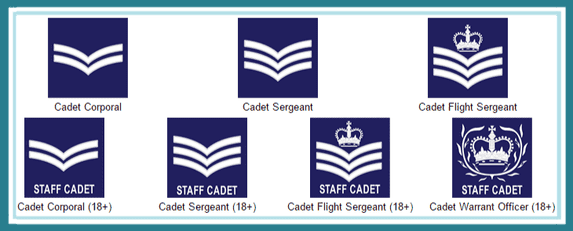CADET RANKS

The photo on the left shows the ranks that can be gained by the cadets themselves. Corporal is the lowest rank and staff cadet Warrant Officer is the highest rank available (this rank can only be achieved at the age of 18-20). These can be achieved through hard work and recognition. The higher the rank, the more responsibility it comes with.
Corporal: They are also classed as a Junior NCO (JNCO). They are expected to be able to control the other cadets at the squadron and be an example to them.
Sergeant: This is the first Senior NCO (SNCO) rank. This rank will provide the individual with even more responsibilities on the unit. They are expected to give training to the new and younger cadets to ensure all standards are upheld.
Flight Sergeant: They are also classed as a Senior NCO (SNCO). They will be expected to help run the squadron with the staff. Also, they have to be able to run a flight and will be responsible for cadets, sergeants and corporals within the squadron. They are also decided by the Squadron Commanding Officer.
Staff Cadet Warrant Officer: They will be taking a big role in the squadron and help with administrative tasks. It is decided by a panel at Wing level. They will required to attend an interview at Wing HQ.
Once a cadet becomes 18, they must go on a course to become a staff cadet (only mandatory in some wings).
Corporal: They are also classed as a Junior NCO (JNCO). They are expected to be able to control the other cadets at the squadron and be an example to them.
Sergeant: This is the first Senior NCO (SNCO) rank. This rank will provide the individual with even more responsibilities on the unit. They are expected to give training to the new and younger cadets to ensure all standards are upheld.
Flight Sergeant: They are also classed as a Senior NCO (SNCO). They will be expected to help run the squadron with the staff. Also, they have to be able to run a flight and will be responsible for cadets, sergeants and corporals within the squadron. They are also decided by the Squadron Commanding Officer.
Staff Cadet Warrant Officer: They will be taking a big role in the squadron and help with administrative tasks. It is decided by a panel at Wing level. They will required to attend an interview at Wing HQ.
Once a cadet becomes 18, they must go on a course to become a staff cadet (only mandatory in some wings).
Adult ncos

These are the NCO ranks for the adult staff. They wear ATC pins on their rank slides to show that they are members of the Air Training Corps.
There is also the range of non-Uniformed members of staff which include Civilian Instructors(CI's), the Squadron Padre and Civilian Committee Members. They do not have to wear uniform.
There is also the range of non-Uniformed members of staff which include Civilian Instructors(CI's), the Squadron Padre and Civilian Committee Members. They do not have to wear uniform.
OFFICERS

The photo on the right shows the ranks that can be achieved as an officer. Officer cadet is the lowest and wing commander is the highest. They play a vital part in the running of the squadron. Officers are commissioned into the Royal Air Force Volunteer Reserve's Training Branch and have the label VRT on their rank slides to show this.
They usually have to join as a civilian instructor or as a senior non-commissioned officer to gather experience and knowledge. An interviewed by the squadron commander then by a Commissioning Board at Regional HQ. If you are successful you will then be
given an RAF uniform.
You will then be given a squadron to attend and a volunteer can claim back their expenses. However, you will have to attend the Officers' Initial Course at Cranwell within your first year of becoming a volunteer.
You are able to specialise in several subjects by going to selective courses such as First aid, Adventure Training etc.
They usually have to join as a civilian instructor or as a senior non-commissioned officer to gather experience and knowledge. An interviewed by the squadron commander then by a Commissioning Board at Regional HQ. If you are successful you will then be
given an RAF uniform.
You will then be given a squadron to attend and a volunteer can claim back their expenses. However, you will have to attend the Officers' Initial Course at Cranwell within your first year of becoming a volunteer.
You are able to specialise in several subjects by going to selective courses such as First aid, Adventure Training etc.
